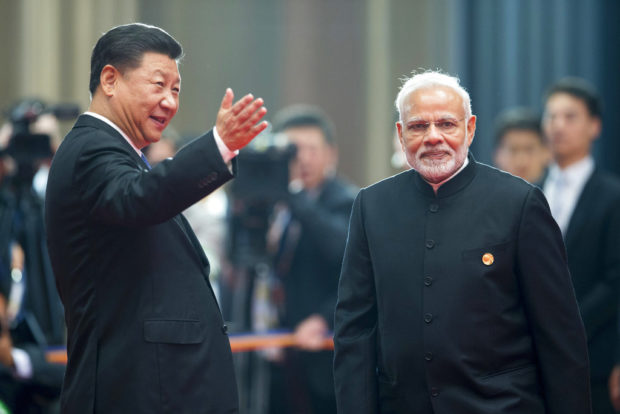Xi extolls free trade at Asia meet as G-7 ends in disarray

Chinese President Xi Jinping (left) welcomes Indian Prime Minister Narendra Modi for a meeting at the Shanghai Cooperation Organization (SCO) Summit in Qingdao in eastern China’s Shandong Province Sunday, June 10, 2018. AP
QINGDAO, China — Chinese President Xi Jinping extolled free trade and criticized “selfish, short-sighted” policies during a closely orchestrated gathering of a Beijing-led bloc Sunday, standing in stark contrast with the G-7 summit that ended in disarray over trade tensions.
“We should reject selfish, short-sighted, narrow and closed-off policies. We must maintain the rules of the World Trade Organization, support the multilateral trade system and build an open global economy,” Xi said. Though his remarks did not mention President Donald Trump, Beijing has sought to portray itself as a defender of free trade in response to the American leader’s support for import controls. This is despite China’s status as the most-closed major economy.
Xi also hailed the entry of new members of the Shanghai Cooperation Organization, calling the presence of Indian Prime Minister Narendra Modi and Pakistani President Mamnoon Hussain “of great historic significance” in opening remarks at this weekend’s summit of in the northern Chinese port of Qingdao. Their two South Asian nations joined the bloc as full members last year.
With tight security, closed roads and restricted press access, the summit’s choreographed show of unity was a striking contrast to the tumultuous Group of Seven summit of leading industrialized nations that concluded Saturday in Quebec and saw the U.S. and its allies divided by escalating trade tensions.
Trump lashed out at Canadian Prime Minister Justin Trudeau in an extraordinary set of tweets from Air Force One, calling him “dishonest & weak” and retracting the U.S. endorsement of the G-7 summit’s communique.
Article continues after this advertisementThe Beijing-led bloc, which experts see as seeking to challenge the Western-led order, is dominated by China and Russia and also includes Kazakhstan, Uzbekistan, Kyrgyzstan, and Tajikistan. Founded in 2001, it was originally conceived as a vehicle for resolving border issues, fighting terrorism, and — more implicitly — to counter American influence in Central Asia following its invasion of Afghanistan.
Article continues after this advertisementThe summit comes as Russia and China have boosted ties in response to the U.S. national security strategy that describes them as America’s top adversaries.
“We should reject the Cold War mentality and confrontation between blocks,” Xi said, adding that the countries should “oppose the practices of seeking absolute security of oneself at the expense of the security of other countries.”
In recent years, the Shanghai bloc’s economic component has grown more prominent, embodied in Xi’s signature, trillion-dollar foreign policy and infrastructure drive known as the Belt and Road Initiative.
Xi announced that China would offer 30 billion yuan ($4.7 billion) in loans through the bloc, highlighting its economic aspect.
Beijing’s infrastructure projects in Central Asia make some in the bloc uncomfortable — particularly India, which alone among members has refused to endorse the program. Russia, too, is wary of China’s expanding influence, and though it has somewhat reluctantly embraced the Belt and Road, it is also seeking to expand its own economic and political leverage in the region through a customs union it dominates known as the Eurasian Economic Union.
China has sought to downplay concerns that the Shanghai grouping is a way for Beijing to project its strategic influence abroad. The Global Times, a Communist Party newspaper, said Sunday in a commentary that unlike Western organizations like NATO and the G-7, which seek to “consolidate the global economic order that is favorable to the Western world,” the Shanghai Cooperation Organization is inclusive.
It is “is not a tool for geopolitical games, seeking hegemony or engaging in international confrontation,” the paper said.
As trade tensions simmered between China and the US in recent months, Beijing has drawn closer to Moscow and New Delhi.
On Friday, Xi presented Russian President Vladimir Putin China’s first Friendship Medal at an elaborate ceremony in Beijing.
On Saturday, Xi met Modi for the second time in two months, signing deals on the export of non-basmati rice and sharing information on the waters of the Brahmaputra River, which runs between China and India, according to tweets by spokesperson of the Indian Ministry of External Affairs Raveesh Kumar.
Xi and Modi also found common ground on security. On Sunday, Xi urged closer cooperation on joint counterterrorism exercises and law enforcement, while Modi called security “our top priority” and said India would play “an active and constructive role” in the bloc to work against extremism in Afghanistan.
Beijing sees the bloc as a force for stability in a poor, unstable neighborhood bordering on its volatile region of Xinjiang, where attacks in recent years by radicals among its native Muslim population killed hundreds and prompted a massive security crackdown, while New Delhi is interested in striking Islamic militant groups targeting India. /ee